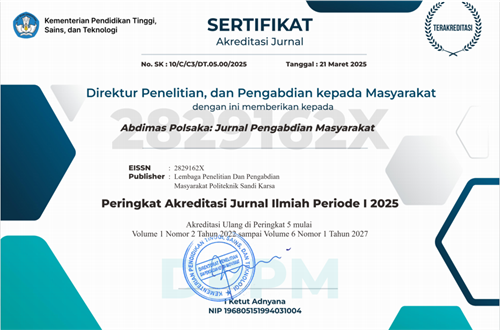Education on the impact of drugs on adolescent reproductive health
DOI:
https://doi.org/10.35816/abdimaspolsaka.v3i2.72Keywords:
drugs, knowledge, reproduktive healthAbstract
According to WHO, reproductive health is a state of complete physical, mental and social well-being and not just the absence of disease or infirmity in all matters relating to the reproductive system and its functions and processes. Narcotics is an abbreviation for narcotics, psychotropic substances and other addictive substances. Narcotics are substances or drugs derived from plants or non-plants, either synthetic or semi-synthetic, which can cause a decrease or change in consciousness, loss of taste, reduce or eliminate pain, and cause dependence. This activity aims to implement health promotion and preventive efforts based on collaboration between professions regarding the provision of health education on the impact of drugs on adolescent reproductive health. The methods used are preparation stages, implementation stages, and activity evaluation. The result of implementing this activity was an increase in teenagers' knowledge and attitudes about the impact of drugs on reproductive health from not knowing to knowing. It was concluded that there is a need for regular outreach and involvement in many communities, health cadres, and schools. Through increasing this knowledge, it is hoped that teenagers can take preventive and proactive steps in preventing the dangers of drugs to health. This holistic approach involves collaboration with health workers, exploring local resources, and ensuring social support to support efforts to prevent and abuse drugs.
Downloads
References
Abdul-Wahab, I., Nungbaso, A. M., Nukpezah, R. N., & Dzantor, E. K. (2021). Adolescents sexual and reproductive health: A survey of knowledge, attitudes and practices in the Tamale Metropolis, Ghana. Asian Research Journal of Gynaecology and Obstetrics, 6(1), 31–47.
Ahinkorah, B. O., Hagan, J. E., Seidu, A.-A., Sambah, F., Adoboi, F., Schack, T., & Budu, E. (2020). Female adolescents’ reproductive health decision-making capacity and contraceptive use in sub-Saharan Africa: What does the future hold? PLOS ONE, 15(7), e0235601. https://doi.org/10.1371/journal.pone.0235601 DOI: https://doi.org/10.1371/journal.pone.0235601
Arifah, I., & Mahfudah, I. (2020). Faktor yang Berhubungan dengan Akses Informasi Kesehatan Reproduksi Daring Pada Mahasiswa. Indonesian Journal of Health Community; Vol 1 No 1 (2020): December 2020. https://e-journal.ivet.ac.id/index.php/ijheco/article/view/1308
Audina, M. (2019). Penggunaan Media Sosial terhadap Penyalahgunaan Obat Terlarang pada Remaja. Jurnal Ilmiah Kesehatan Sandi Husada, 8(2), 103–108. https://doi.org/10.35816/jiskh.v10i2.123
Damaiyanti, S., & Hevira, L. (2022). Dampak pemakaian obat terlarang dan minuman keras terhadap kesehatan reproduksi remaja. Empowering Society Journal, 3(3).
Hartini, L. (2023). Hubungan Penyalahgunaan Narkotika Terhadap Kesehatan Reproduksi Pada Lembaga Pemasyarakatan Perempuan Kota Bengkulu. Husada Mahakam: Jurnal Kesehatan, 13(1), 29–37.
Hochberg, Z. ev, & Konner, M. (2020). Emerging adulthood, a pre-adult life-history stage. Frontiers in Endocrinology, 10, 918. DOI: https://doi.org/10.3389/fendo.2019.00918
Ilbert, R., & Marfuah, D. (2021). Pre-marital Sexual Behaviour in Student Dating: A Literature Review. KnE Life Sciences, 726–735. https://doi.org/10.18502/kls.v6i1.8748 DOI: https://doi.org/10.18502/kls.v6i1.8748
Lusia Sinta Herindrasti, V. (2018). Drug-free ASEAN 2025: Tantangan Indonesia dalam Penanggulangan Penyalahgunaan Narkoba. Jurnal Hubungan Internasional, 7(1), 19–33. https://doi.org/10.18196/hi.71122 DOI: https://doi.org/10.18196/hi.71122
Mahaputra, I. B. G. B., Dewi, A. A. S. L., & Suryani, L. P. (2022). Upaya Penanggulangan Tindak Pidana Penyalahgunaan Narkotika. Jurnal Analogi Hukum, 4(3), 311–315.
Nmadu, A. G., Mohamed, S., & Usman, N. O. (2020). Barriers to adolescents’ access and utilisation of reproductive health services in a community in north-western Nigeria: A qualitative exploratory study in primary care. African Journal of Primary Health Care & Family Medicine, 12(1), 1–8. https://doi.org/10.4102/phcfm.v12i1.2307 DOI: https://doi.org/10.4102/phcfm.v12i1.2307
Oktiawati, A., Fauziah, M. N., & Laili, R. T. N. (2021). Edukasi kesehatan reproduksi remaja di panti asuhan darul farroh. JABI: Jurnal Abdimas Bhakti Indonesia, 2(2), 56–63. https://doi.org/10.36308/jabi.v2i2.307 DOI: https://doi.org/10.36308/jabi.v2i2.307
Prijatni, I., Prijatni, I., & Rahayu, S. (2016). Kesehatan reproduksi dan keluarga berencana. Pusdik SDM Kesehatan.
Roden, R. C., Schmidt, E. K., & Holland-Hall, C. (2020). Sexual health education for adolescents and young adults with intellectual and developmental disabilities: recommendations for accessible sexual and reproductive health information. The Lancet Child & Adolescent Health, 4(9), 699–708. https://doi.org/10.1016/S2352-4642(20)30098-5 DOI: https://doi.org/10.1016/S2352-4642(20)30098-5
Septiadi, M. A., Thaifury, A. A., Sasmita, F. K. G., & Kusyaeri, I. A. (2022). Perspektif Mahasiswa Terhadap Kebijakan Pencegahan Penyalahgunaan Narkoba di Kalangan Remaja. Khazanah Multidisiplin, 3(2), 219–230.
Siddiqui, M., Kataria, I., Watson, K., & Chandra-Mouli, V. (2020). A systematic review of the evidence on peer education programmes for promoting the sexual and reproductive health of young people in India. Sexual and Reproductive Health Matters, 28(1), 1741494. https://doi.org/10.1080/26410397.2020.1741494 DOI: https://doi.org/10.1080/26410397.2020.1741494
Suprapto, S., & Arda, D. (2021). Pemberdayaan Masyarakat Melalui Penyuluhan Perilaku Hidup Bersih dan Sehat Meningkatkan Derajat Kesehatan Masyarakat. Jurnal Pengabdian Kesehatan Komunitas, 1(2), 77–87. https://doi.org/10.25311/jpkk.Vol1.Iss2.957 DOI: https://doi.org/10.25311/jpkk.Vol1.Iss2.957
Suprapto, S., Arda, D., & Kurni Menga, M. (2024). Community empowerment in an effort towards quality health. Jurnal Pengabdian Masyarakat Edukasi Indonesia, 1(2), 49–55. https://doi.org/10.61099/jpmei.v1i2.40 DOI: https://doi.org/10.61099/jpmei.v1i2.40
Wardani, L. K., Sektiany, A., Matkusa, A. B., Lestari, A. B., Widiana, D., Nanda, E. L., Lusita, E., Kusuma, I. A., Wijayanti, L. A., & Gadung, L. B. (2019). Pendidikan Kesehatan Bahaya Narkoba bagi Kesehatan Mental pada Siswa SMK Al Huda Kota Kediri. Journal of Community Engagement in Health, 2(2), 19–26.
Wati, I., Ramadianti, M., Nurbani, N., & Pratiwi, P. (2018). Pengaruh Konentrasi Pelarut, Dan Nisbah Bahan Baku Dengan Pelarut Terhadap Ekstraksi Kunyit Putih (Curcuma zedoria.)
Additional Files
Published
How to Cite
Issue
Section
License
Copyright (c) 2024 Abdimas Polsaka

This work is licensed under a Creative Commons Attribution 4.0 International License.





















